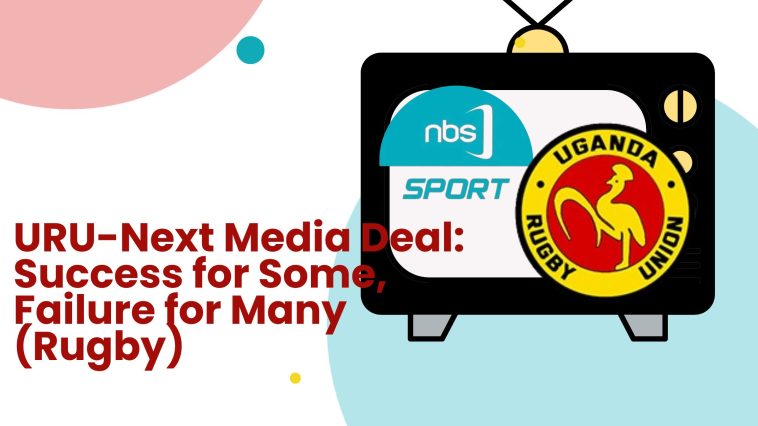On 15 April 2025, the Uganda Rugby Union (URU) and Next Media Services renewed their three-year broadcasting agreement. NBS Sport will once more include the Nile Special Rugby Premiership, the National 7s Series, the dead Uganda Cup, and, for the very first time, Uganda Schools Rugby Association (USRA) matches and university 7s, and the nonexistent 15s tournaments. In the evening of his term unless he touches the constitution URU President Godwin Kayangwe and Next Media CEO Kin Kariisa hailed the deal for increasing rugby’s profile and providing “continued growth” before the 2025 Rugby Africa Cup, which will be hosted at Mandela Stadium in Uganda.
First, credit where credit is due: providing schools and varsity rugby with a TV slot is a welcome acknowledgment that tomorrow’s stars must be exposed today. Televising the Africa Cup qualifier on NBS will enable millions to view our national teams in action on home soil. A secure, multi‑year contract gives URU negotiating clout with sponsors and could, in theory, provide new revenue streams for clubs and players. Again, this is on paper; URU has never fulfilled 50% of what it put on paper; the year plan is normally public knowledge; that’s how incompetent those guys under the staircase below the tennis court are; I am wondering if the Next Media CEO has been to the URU HQ…
But this deal is not the forward leap that it appears. Under Kawowo Sports, we saw more games on a given weekend, picked from across Uganda’s regions. Under NBS Sport, only headliner games make it through; every weekend, you will watch Pirates so long as they are playing in a 10km radius of the Kamapla CBD. Dozens of clubs, some of the heart of their neighborhoods, continue to wait for a single camera to focus on them, especially now that the Uganda Cup has been mentioned. In practice, the new deal will prioritize coverage at the top, crowd everyone else out, and undercut the very pipeline of development URU claims to be nurturing; this is the same route the beer guys took.
Second, there has been an open retreat. The precise terms of the URU–Next Media deal remain hidden from the public gaze. With 46 million Ugandans who help pay taxes that subsidize our national teams, and with both men’s and women’s teams to consider, all members of society have a right to some voice in the handling of broadcast rights, On X Benon M. Gowa @BenonGowa articulated the matter this way.
“Uganda Rugby Union should publish its contract with Next Media. The Union is required to furnish accountability for exploiting its commercial rights under section 76 of the National Sports Act, Cap.151 and regulation 6 (h) of the National Sports Regulations, S.I. No.24 of 2025..”
The Union must provide an account for exercising its commercial rights pursuant to section 76 of the National Sports Act, Cap. 151 and regulation 6(h) of the National Sports Regulations, S.I. No. 24 of 2025 That statement refers to the law, which requires URU to make available all significant commercial contracts. Until then, there is no means by which players, supporters, and sponsors can make an informed assessment of whether this contract really is in the best interests of the game or is merely enriching a handful of decision-makers.
Third, several voices within the club network protest the authority of the present Executive Committee, which was elected two years ago. Anne Sizonu an authority in Ugandan Rugby and most likely future president of URU cautioned through her X @AnneAlanSizomu
“Another reason to ensure that none of the current Excomm members is voted back in. You club chairpersons don’t let players down. You have one game broadcast per weekend & you lock out others. Plus, why are you signing deals beyond your term? And you lied with varsity games..”
That frustration echoes on social media and clubhouse forums. If URU leaders negotiate long-term deals without new club approval, they risk violating their own democratic principles—and undermining the trust needed for any sporting body to thrive. Meanwhile, URU is a Union made up of clubs, but for some reason, the stewards that make up the Excomm get high on something and forget every tenant is a true union.
However, some benefits must be recognized. Next Media’s production is better than before. The commentary is sharper, especially after signing a rugby expert “god” from Kawowo Sports, graphics cleaner, and highlights packages more polished. For top‑shelf rugby fans, NBS Sport offers a viewing experience closer to international levels with more cameras on the ground. The inclusion of school and university matches offers real potential—assuming those games actually make it on the air, week in and week out. The last time a University 15s tournament was attempted, it was halted after one game weekend, and no explanation was given apart from the usual “Rugby Must win” by the URU head of operations, Yayiro Kasasa Musisi. The rest has disappeared like a mist after the sun comes out. Meanwhile, I will be lighting a candle for CURA’s plans for a mini 15s University tournament.
But there is a caveat to this vow. URU must include minimum coverage terms in the agreement. Officials at the club level should demand assurances that a minimum of two games per weekend drawn from Central, Eastern, Northern, and Western regions appear on screens nationally. Otherwise, rugby risks becoming Kampala sport, dominated by “big clubs.” And hence being elitist as the Boda Boda guys normally put it.
As the Rugby Africa Cup draws near, URU will be put to the test for the first time under the new arrangement. Will there be boys from villages in Lango on TV? Will girls from Arua have airtime for their matches? If selectivity in coverage continues, then the entire ethos of national cohesion through sport will be a façade. Anyway, Ugandan Rugby is known for talking big, and then everyone drinks beer and goes back home to enjoy their pets.
Equity also means that URU must publish the contract. Through the publication of the agreement, confidence is fostered, and controlling bodies—such as the Uganda National Council of Sports—are in a position to verify compliance with revenue-sharing arrangements. If URU demands payment of 30 percent, for example, of the television revenue to regional unions, there must be signed pages for confirmation.
With transparency, URU also needs to include a revenue-floor guarantee. Even if sponsors are not meeting their targets, clubs will receive a minimum figure for travel, equipment, and youth programs as basics for starters. That is the same kind of system used for successful grants in other sports in Africa, where a small slice of TV rights money pays for coaching clinics, league administration, and medical cover. It’s what the guys south of the continent do to win the Rugby World Cup.
Without such protection, the NBS agreement has the potential to repeat the “champions‑only” partiality of past sponsorships. When Nile Special sponsored only the Premiership, second‑division matches fell off the radar. Now, if NBS does the same narrow focus, entire levels of rugby will fall further from public awareness and from the fantasies of children who might otherwise pick up a ball.
We, the skeptics, think that URU anticipated the glamour of an NBS deal to overshadow any complaint. Next Media reaches millions of Ugandans, after all. However, reach does not automatically correct structural weaknesses. Coverage must be broad rather than just deep; it must be open rather than just glossy.
However, it can be made to benefit all tiers of the sport. URU may release the contract, add enforceable minimum-coverage provisions, and establish a joint broadcast committee–players, coaches, and fans—to review the schedule quarterly. That committee could rotate fixture previews between regional clubs so that each community gets itself on the air.
There must also be direct channels of feedback to the players. If there are never broadcasts of matches played in Jinja or Mbale, team captains should report through URU’s systems. A tally of “missed broadcasts” could trigger financial penalties or advertising space for free for the implicated club. Thus, accountability is built into the model of broadcasting itself.
Fans also have a part to play. They must insist on transparency. When URU President Kayangwe speaks of “continued growth”, we must ask which teams, which schools, and which districts will actually grow. That is not obstructionist. It Is the only way to ensure that all of the broadcast revenue coins return to benefit all of the stakeholders—infrastructure, coaching, youth rugby, and national pride. The President is the kind who may not be open to these things, but times are changing, and if rugby doesn’t move fast, it will be left behind. Besides, rugby is the biggest product NBS has secured as football is in another league.
NBS Sport has shown it is capable of producing high-quality coverage. URU is the key to balanced coverage. Together, they can make a broadcast deal that lifts Ugandan rugby from an elite event to a truly national sport. For now, though, this renewal feels like a missed opportunity. By shining the light on “big games” and hiding contract details, URU risks worsening the regional inequities it once vowed to erase. Let’s wait for what the RDOs have to say
The clock Is already ticking toward the July 2025 Africa Cup. URU must act quickly to extend the broadcasting footprint, comply with legal transparency requirements, and sign in writing a commitment to share airtime fairly. Otherwise, this three-year agreement will be music to Kampala boardroom lips only—excluding the rest of Uganda from watching.
This post was created with our nice and easy submission form. Create your post!





